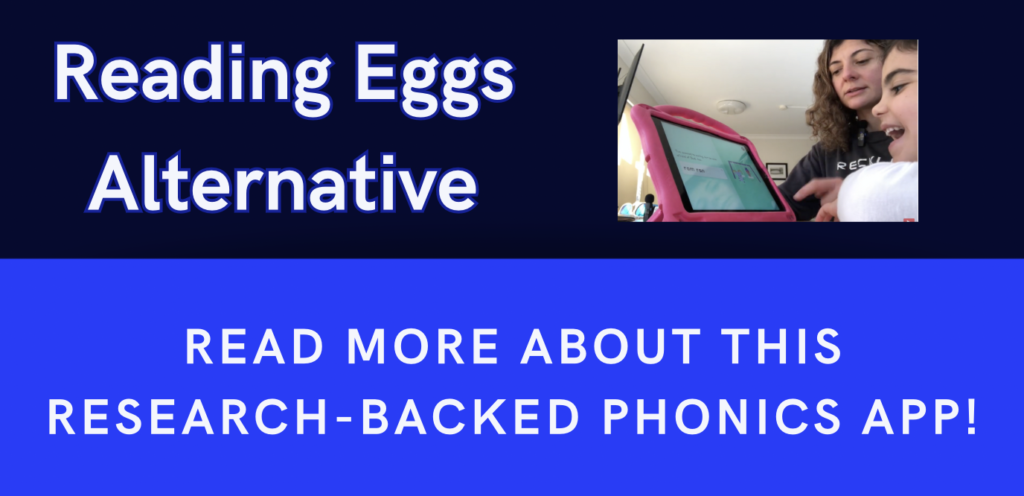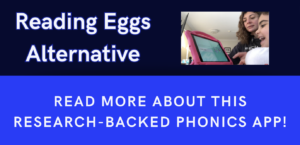Are you looking for an interactive way to help your child learn to read? Then it is pretty likely that you have heard of Reading Eggs! In this blog post, we will take a closer look at its features, cons and benefits.
After reading this article, you’ll know whether this learn-to-read app is a good fit for your child or not, and what you can expect.
Will Reading Eggs really help your child develop his/her reading skills, as it promises?
Let’s find out!
What is Reading eggs?
Reading eggs is one of the many literacy apps out there that claims to be based on phonics and claims to teach your child to read.
It just happens to be (probably) the most popular one. It is even a popular app in schools. That means that children use it when they are at school in their English lessons, and maybe you even get a free subscription for your kid directly from the school.
Reading Eggs uses a variety of interactive games, songs and activities, and the program is designed for children from 2 – 13 years old, and is suitable for kids with different reading abilities.
So, taking all of this into account, the most logic assumption is to think that it must be an amazing app, right?
But… Is that true? Is Reading Eggs worth the hype?
Does it live up the expectations?
Is Reading Eggs a good app?
In certain ways, it is a great app, but —in my opinion— there’s also a problem with Reading Eggs. And you need to be aware of…
That problem is actually the reason why this app was not included in our ranking of the best literacy apps.
But before I reveal what the problem is and what you can do about it, I’m also going to share with you what’s good about this app… the reasons why-I think- Reading Eggs has become so popular.
(As I said before, your child may be using this app at school and/or you may even get a subscription for free from your child’s school… If that’s the case, it would be a pity not to use it!)
Benefits of Reading Eggs
#1: The app teaches the right letter sounds.
Reading eggs doesn’t add that unnecessary /uh/ sound at the end of consonants that we’ve already discussed so many times in this website.
If you don’t know what I’m talking about, there are other posts you can read in this website about the importance of learning the right letter sounds, and how this has a direct impact on your child future’s blending capabilities. For instance, this one or this one.
 #2: Children seem to have fun using it.
#2: Children seem to have fun using it.
It includes exercises, activities, games and songs that are catchy, and children seem to enjoy.
For instance, my younger child —who is the one mainly using this app at the time of writing this article— loves listening to some of the songs in the app over and over..
The songs have rhymes, they teach children the letters, the sounds, etc.
In other words, they have an educational purpose.
#3: The rewards system.
In my experience, some children can get kind of obsessed over how many eggs they have collected and what rewards that they can get in exchange for the eggs.
In fact, children seem to really love the “din-din-din” sound effect that they hear when they collect more eggs for doing things correctly and completing tasks. Using my older daughter’s words, this sound is “very satisfying.”
#4: This app does a good job at putting your child in the right level.
The way it works is that children are asked a series of literacy questions, like:
“Which of these words makes this sound?”, or
“Which of these words says ‘cat’?”, or
“Pair lowercase and uppercase,” etc.
According to their answers, they are placed in the right level. The app does a pretty good job placing children in the right level.
#5: The app has some blending activities that teach how to blend sounds in the right way.
This goes in line with what I have mentioned before. When you learn letter sounds in the right way right from the beginning, blending becomes way less problematic.
#6: Parents have access to reports, which allows them to easily keep track of their child’s progress.
Children also get certificates for their achievements, which is something they love, and you can celebrate with them.
You know how this truly motivates children!
#7: They have a library of books covering lots of different themes and categories: nature, family, friends, history.
Apart from covering a huge range of themes and categories, books also classified by Lexile level.
On top of that, at the end of each book, there are some reading comprehension quizzes for children to complete.
If they get quiz right, they get some magic eggs.
#8: They include some print-outs with activities and worksheets to follow along the online lessons.
In that regard, Reading Eggs presents itself as a full reading curriculum (app + print-out materials).
#9: They offer a 30-day free trial.
The 30-day free trial is something that I always really appreciate with apps because you really don’t know if your child is going to like it or not until he/she tries it.
Reading Eggs—Access 30-Day Free Trial!
But…
The most important question of all…
Do children learn with the Reading Eggs app?
In my experience, children learn something using Reading Eggs, but it doesn’t, of course, magically teach children to read…
You can’t outsource this big task to this app, or any other literacy app!
Literacy apps have their place as a supportive tool to your child’s learn-to-read lessons, but you can’t expect miracles either!
To give you an example, with my youngest daughter, I feel the app is helping her develop that automatic reflex children need to have of letters and letter sounds to become a fluent reader.
In fairness, she had already developed it for some letters (but not for all of them), and she’s making great progress with the rest of them. Besides, at the same time, she’s reinforcing what she already knows. And I believe the app has definitely something to do with this.
While not spectacular results, everything looks pretty good so far, SO…
What’s the big problem with Reading Eggs, then? Cons of Reading Eggs
In my opinion, the main con with Reading Eggs is that it encourages guessing and memorization… And right from the very start of the journey!
And encouraging memorization and guessing is not coincidence.
On the contrary, these strategies are built in on the app by-design.
But, why?
Well, even if I do not like it, encouraging children to guess and to memorize words when they are learning to read is still commonplace.
I won’t go into detail in this article as to why I do not like it, why it is negative in the long run and how this strategy doesn’t give them the right foundational skills… It’s a long story and we have other articles and videos on the Learning Reading Hub YouTube channel where you can learn all about this, like this one or this one.
The best thing, in my opinion, for you to understand what I mean is to see an example together. Hopefully this fragment from a YouTube video in our channel will help you to do just that.
On top of this, many parents have raised concerns about the actual selection of books available in their library, pointing out that there are books that are not appropriate for all kids.
This is especially concerning with older children who may encounter books about particularly sensitive topics without having an adult to discuss them with. At the very least, they argue, they should be warned beforehand about the presence of these books in the library.
To be honest, my children are still too young for this to be a concern, as they still need my support when picking books. However, I do understand the concern.
So, after all of this you might be wondering…
Do I allow my children to use the Reading Eggs app?
And… Why do I allow my child to use Reading Eggs if I do not like the guessing/memorization/”word solving” strategies it uses?
Well, first of all it was a test, so I could talk share my first-hand experience.
Besides, we had been using another app for a while. and you know how children can be like. After using it for a while, they get bored and they want something fresh and new!

Finally, as I said, there are certain things that I also like about the app. I’ve also shared them with you today in this review.
However, encouraging guessing and memorization is a dangerous path, so, this is what I do…
Basically, I do not allow her use the app if I am not around. If I detect that she’s on an activity that is all about guessing, I say: don’t worry about this one, mommy will do it with you, and I sort of do it for her. I don’t want her getting into the habit of guessing words based on clues!
Reading Eggs—Access 30-Day Free Trial!
Alternatives to Reading Eggs
Find below my favorite alternative literacy apps to Reading Eggs.
To discover even more apps, check this post out!
How much does Reading Eggs cost? Is it worth the money?
At the time of writing this review, Reading Eggs offer a 30-day-free trial. After that, it costs $9.99/month.
Reading Eggs allows you create 4 different reader profiles, and it also includes MathSeeds (their app for numeracy skills).
The price is pretty similar to other literacy apps out there.
For instance, Reading .com offers a 7-day free trial. After that, it costs $12.49/month, or you can get their yearly subscription for $6.25/month ($74.94).
Hooked on Phonics offers a 7-day free trial. After that, it is $8.99 a month or you can get a lifetime subscription for $49.99.
Reading Eggs Conclusion
To sum things up:
There’s a good side to Reading Eggs and a bad side to Reading Eggs.
It is, in my opinion, a balanced approach learn-to-read app. The balanced approach means taking a bit of phonics and mixing it up with a bit of whole word approach. Sorry, maybe I’m getting too technical here. If you want to learn more about the balanced approach, the whole word approach etc., you can read this article.
Anyway, long story short, the balanced approach heavily relies on asking children to “guess” and encourages children to read words they are probably not ready to read yet (with the phonics knowledge they have at that point), so they have to rely on clues, guessing, and memorization.
The phonics component of this app is nicely designed, and I like it, but if you are going to use it you need to be aware of the guessing component as well.
You may choose to use it anyway, but in my opinion, if you don’t want to confuse your child and you want teach him/her to read with synthetic phonics (not with the balanced approach) you are going to have keep an eye and police the exercises, as I do.
Apart from the lessons, you also have games, songs and fun activities. They also have a maths curriculum (mathseeds), but we are not focusing on this one today.
Besides, this article has been focused mainly on how to use this app for young children that are still on the first stages of learning to read.
If you have an older child, you may want to err on the side of caution with the selection of books in their library. Take a look beforehand to assess whether you feel comfortable with the book choices and how sensitive topics are presented.
If you are ready to get started, don’t forget to take advantage of their 30-day free trial. Access it here!
However, if after reading this article and learning about the pros and cons of Reading Eggs, you are still in doubt and still want explore other options out there, I recommend you read this other post next.

Hey there! I’m Laura – an author, YouTuber, blogger, and the creator of the “Learning Reading Hub” platform. I created this space to dive into the world of reading instruction and to shout from the rooftops about how vital it is to use the right methods for teaching reading. I’ve got a TEYL certification (Teaching English to Young Learners), plus a Journalism degree from the University of Navarra in Spain, along with a Master’s Degree in Communication.
I’ve always loved digging into research, jotting down my thoughts, connecting with people, and sharing what makes me tick. With a background in marketing, digital projects, and the education scene (especially language learning), I’m all about wearing different hats.
When my first kid needed to learn how to read, it opened my eyes to the challenges and complexities involved. This journey took me through a rollercoaster of self-teaching, eye-opening discoveries, and yeah, some letdowns too. There’s so much conflicting info out there, along with methods that just don’t cut it. And let’s face it, these issues are way too common.
Now, I’m all about channeling that passion (without sounding like a know-it-all!) and sharing my journey. My mission? Making it easier for those who are on the same path I once was.
My heart’s with my family and the amazing Learning Reading Hub project. I live with my husband and two little ones, raising them in a bi-lingual environment (English and Spanish).




One reply on “Reading Eggs Honest Review – The Brutal Truth About this App and Reading Curriculum”
I found your review on Reading Eggs to be very informative and helpful in understanding the pros and cons of using this app for reading curriculum. It’s great that you took the time to share your honest thoughts with other readers, so they can make an informed decision about whether or not this is the right tool for their child’s learning needs. Thank you!